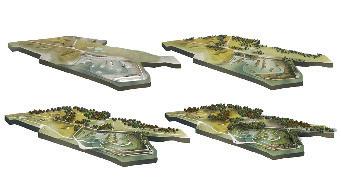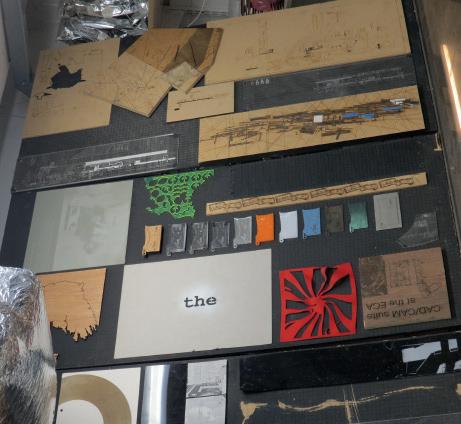
8 minute read
Architectural History & Heritage MA (Hons
When you arrive you will be assigned a Personal Tutor who can offer assistance and advice throughout your academic journey, including advice on choosing your option courses, what to do if you need to take time out, or need advice when personal circumstances affect your work.
Architecture teaching
Advertisement
Studying architecture consists of a continuous series of design exercises and projects. You will have a studio to use as a centre for your studies along with access to workshops. Your work will be assessed on coursework, essays and examinations.
In your first year, you will study architectural history and the fundamentals of building construction, environmental design and sustainability. You will have weekly lectures and tutorials throughout the year in these subjects. You will also study design in the studio with co-ordinated studio teaching days every week, where studio tutors will provide practical support and guidance.
Throughout the year in conjunction with our school’s student society (EUSAS) you will benefit from a rolling programme of seminars from visiting architects who will present their work. Architectural History and Heritage teaching
Architectural History & Heritage is taught through lectures and tutorials and is assessed by essays, examinations and class presentations.
During first and second year, you will be part of a vibrant community of up to 300 students, drawn from all areas of interest and expertise, and will be supported from your first year by EUSAS, and have the opportunity to join our Peer Families from your second year.
Our community includes students from architecture, history of art, languages, history, English literature and civil engineering.
In your third and fourth years, there is the opportunity to undertake an internship with a museum, archive or historic environment agency. You will write a dissertation of 10,000 words on a topic of your choosing in year four. Landscape Architecture teaching
Within Landscape Architecture, studio-based design teaching, often on a one-to-one basis, is central to the delivery of our programme.
Design solutions are then reviewed by staff and students during design critiques. Our degree programme has been organised to recognise and encourage self-directed study as you progress. You will also take part in lecture based teaching, including classes at the internationally renowned Royal Botanic Garden Edinburgh. Assessments are based on course work, essays and examinations.
Landscape Architecture has outstanding links to practice and the profession generally; several Landscape Architecture academics are award-winning practitioners themselves. Visiting practitioners regularly deliver coursework lectures and take part in crits. Additionally, throughout the year we host a seminar programme where practising landscape architects present their work. Assessment
You will predominantly be assessed by a combination of coursework, portfolio work and presentations. Some courses are assessed by written essays and in fourth year there is a dissertation submission.
FACILITIES
We are home to some of the best equipped workshop facilities in the UK, with extensive studio accommodation and a specialist library containing over 20,000 books covering every aspect of architecture, architectural history and heritage, and landscape architecture.
Within our workshops you can work – weld, lathe, construct, vacuum form, drill or cut – with a wide range of materials. We also have digital rapid prototyping and computer-controlled laser-cutting, all with expert technical staff to provide practical assistance and support.
We offer dedicated computing facilities with a range of specialist software that include sophisticated 3D modellers such as Rhino, BIM packages and environmental simulation. This is complemented by a range of in-house scanning, plotting and printing facilities and access to photographic and video equipment, as well as dedicated editing suites.
Digital prototyping boards and equipment (Arduino and LoPy, used for interactive architecture projects) are available alongside photographic and video equipment in Minto House.
Our Matthew Gallery is used for reviews of your work, and also runs a varied and immersive series of exhibitions throughout the year. Our Art and Architecture Library is in Chambers Street and hosts a comprehensive and specialist collection of books, journals and digital images. ECA offers a diverse range of studios and workshops, libraries and collections, and places to perform and show your work.
What’s more, we encourage creativity and skills development, so all of our college-wide technical facilities can be accessed through prior arrangement and discussion with relevant staff, irrespective of your core discipline.
Model workshop
There are two model workshops within ECA, where you can work with machinery and hand tools for the cutting, shaping, and general fabrication of woods and metals. As well as an array of fixed machinery and hands-on tools, the workshops have laser cutting machines and 3D printers for precise modelling work. The research workshop also caters for larger construction projects, including fabric formed concrete.
Digital fabrication.
Metal workshop
This workshop is equipped to deal with both large and small-scale projects, with a variety of hand tools, welding torches, and automated machinery for constructing prototypes and final pieces. You will be encouraged to develop manual skills such as welding and folding, as well as having access to the use of the steel guillotine and CNC plasma cutter, which cuts metal precisely based on work created in design software. Wood workshop
This large wood workshop hosts a huge range of machinery and hand tools for the cutting, shaping, and general fabrication of woods, as well as metals, plastics, and cardboard. The work that goes on here can be for anything from architecture models and art pieces, to costume design and furniture products.
Explore all our facilities across ECA and virtual tours online at:
www.eca.ed.ac.uk/facilities www.eca.ed.ac.uk/tours
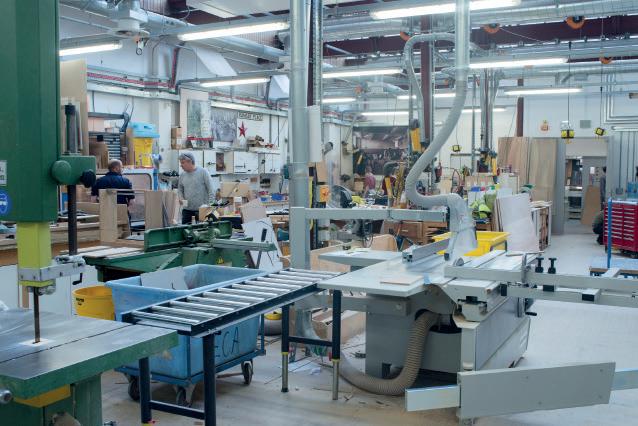
Wood workshop. Photo: Joseph Wilson.
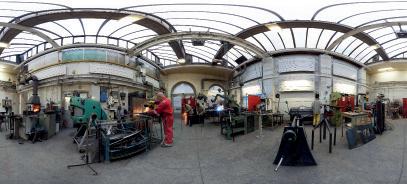
Graduates from the Edinburgh School of Architecture and Landscape Architecture are highly sought after and can be found at work nationally and internationally, often holding highly influential positions in leading organisations around the world.
Architecture
Typically, students on the MA (Hons) Architecture programme proceed to the second degree required by the architecture profession for certification to practise as an architect. On completion of the second degree, graduates complete a period of practical training and then become registered architects, with professional recognition without restriction in the UK and Europe. While most graduates gain employment in private practice, others choose to work in allied professions, such as project management, graphic design, property, game design or architectural VR/ visualisation.

Architectural History & Heritage
Graduates from Architectural History & Heritage can be found working in conservation, land management, heritage and historical consultancy. They have also entered a wide range of professions connected to the built environment and humanities.
Landscape Architecture
Our graduates quickly gain employment primarily in private practice but also in local government and with public bodies such as Scottish Natural Heritage or the Countryside Agency. In the UK, usually after around two years, graduates take their Pathway to Chartership exams. Many of our graduates progress to leading positions in the field of landscape architecture worldwide.
Our services
The University’s Career Service looks to enhance your university experience from the moment you arrive, not just in your final year, so we encourage new students to engage with our services from day one. We offer:
_ A dedicated careers consultant for your
School offering targeted information resources, newsletters and one-to-ones.
_ Information and advice in person via our drop-in centre in the Main Library, and available 24/7 via our websites, blogs and social media.
_ Careers consultations.
_ CV and applications advice.
_ Volunteering opportunities within the University and beyond it. _ Go Abroad opportunities.
_ The Edinburgh Award – get recognition on your final transcript for additional work and extracurricular activities you’ve been part of during your time with us.
_ Part-time and vacation jobs, internships, graduate jobs and more, via a dedicated job site.
www.ed.ac.uk/careers
Adam House. Photo: Federica Mentasti.
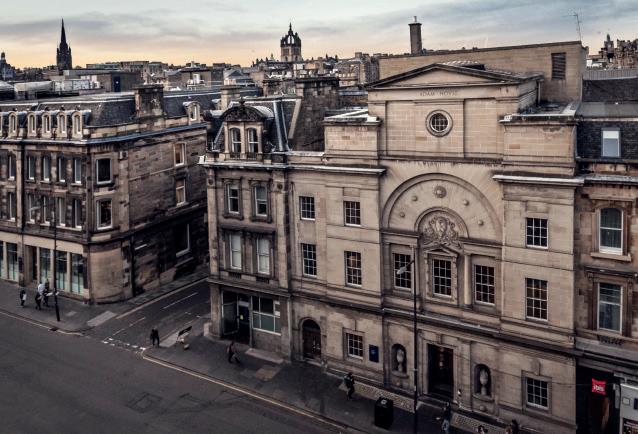
ALUMNI PROFILE
Morbheinn McAllister
Landscape Architecture MSc, 2018
Graduate Landscape Architect
Looking for something alternative to architecture, landscape looked like it could be a fun, exciting, up-and-coming subject that dealt with a huge range of social, aesthetic and environmental issues.
Throughout the programme I was encouraged to be creative and to develop my own personal approach to design. I think this is one of the most rewarding elements of the course, the opportunity to think outside the box and create unique outputs in response to different landscapes in both local and international settings.
I had the opportunity to spend twelve months working at the renowned Edinburgh-based landscape architects, GROSS MAX. The placement allowed me to apply the skills I had learned over the previous three years to a real-life setting, like working on the massive Greenwich Peninsula development in London. This experience allowed me to develop both my design and graphic skills hugely, and prepared me for the intensity of the final year. In my short three months in practice so far, I have been given the opportunity to work on a huge variety of projects ranging from a distillery in the Highlands, to the redesign and re-imagination of two streets in Glasgow as part of the Glasgow Avenues project.
The Landscape Architecture programme at ECA provides an amazing opportunity to be creative and develop your own style in the discipline. Seize this opportunity and make the most of being able to design without limits.
The MSc in Landscape Architecture has been replaced by the MA(Hons) in Landscape Architecture. This four-year undergraduate degree is fully accredited by the Landscape Institute.
I HAD A FANTASTIC EXPERIENCE STUDYING LANDSCAPE ARCHITECTURE... I DIDN’T JUST GAIN SKILLS AND KNOWLEDGE FROM THE PROGRAMME, I GAINED A COLLECTIVE OF LIFE-LONG FRIENDSHIPS WHICH HAVE CONTINUED TO THRIVE THROUGHOUT OUR TRANSITION INTO PRACTICE.
